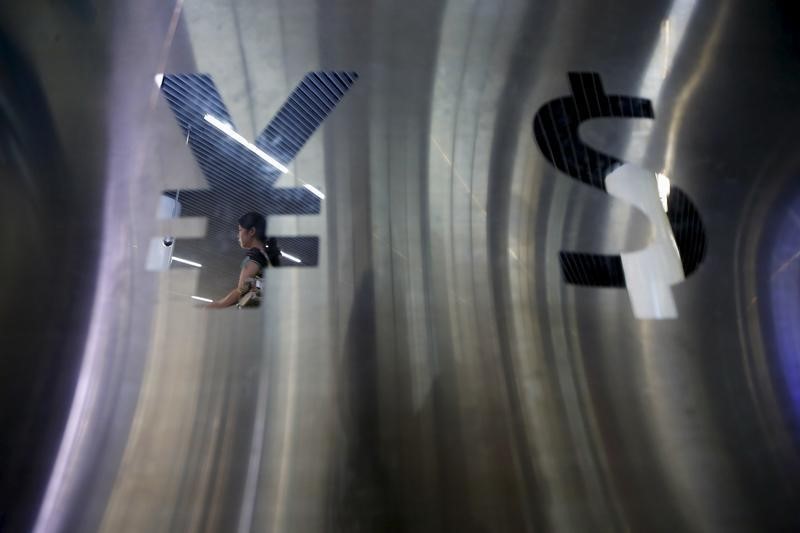SHANGHAI (Reuters) - Even as the International Monetary Fund prepares to accept China's yuan in its basket of reserve currencies, a major diplomatic victory for Beijing's campaign to internationalise the currency, foreign companies are growing more sceptical.
Thanks to recent reforms in China and the endorsement of key European governments, including Britain during a visit by President Xi Jinping last month, the yuan looks increasingly likely to find its way into the IMF reserve basket, known as Special Drawing Rights (SDR).
The IMF seal of approval would come on top of other diplomatic coups: European endorsement of Beijing's new regional development bank, another channel for pushing the yuan outwards, and the recent announcement of a trading platform for yuan-denominated financial products in Germany.
"It's a big step for the RMB's internationalisation if the currency is included (in the IMF basket)," said an executive at a Chinese multinational in Hong Kong, who said he expects the move would make his foreign counterparties more willing to settle transactions in yuan.
So far this year, however, the willingness of foreigners to hold offshore yuan (CNH) has flagged as China cut interest rates and the United States prepared to raise them, causing the yuan to slide over 2 percent to 6.3 per dollar.
Under depreciation pressure from the market, CNH interest rates have risen above onshore rates, overseas yuan deposits have fallen, and issuance of offshore yuan bonds has slowed.
It is true that raw figures show international payments using yuan have risen steadily. The People's Bank of China (PBOC) reports that 27 percent of China's trade was settled in yuan in the first nine months of the year, compared with 22 percent for all of 2014, and the currency is now battling the Japanese yen for popularity as a global payment currency according to payment system operator SWIFT.
But such figures exaggerate the yuan's popularity overseas.
Around three in four of the payments captured by SWIFT, for example, are not truly international, merely crossing the internal border between mainland China and Hong Kong. The data does not show what portion of these transactions involve foreign firms' Hong Kong subsidiaries, as opposed to internal transfers within Chinese conglomerates.
And Chen Long, economist at Gavekal Dragonomics in Beijing, said these trade settlements were driven mostly by foreign clients paying Chinese exporters in yuan, effectively reducing their exposure to further depreciation.
"Renminbi payments continue to rise but exports are rising faster than imports. That's how you have offshore deposits falling," he said.
DEPRECIATION FEARS
Waning appetite for yuan is partly due to the PBOC's surprise decision to devalue the currency in August.
Since then the PBOC has moved to restore confidence, intervening onshore and off to hold the currency steady, but there's more to foreign caution than short-term worries about whether the currency is going to rise or fall.
National governments may be strategically concerned about an economic overdependence on the dollar, but company executives don't share such concerns and many still see little profit in switching from dollar to yuan given cost and risk.
"Our contracts are denominated in U.S. dollars, regardless of the customers' domicile," said Phil Hughes, director of Technical PR at microprocessor maker ARM, which is also enjoying rising sales to China.
Australian mining giant Rio Tinto (L:RIO), for example, which looks set to sell around $18 billion worth of iron ore to China this year sold only one cargo to Baosteel for yuan in 2014, and described it as a one-off transaction.
"We have not seen any trend towards customers wanting to settle in non-U.S. dollars," said an executive at another big company with substantial China trade.
Another treasurer told Reuters that the yuan trading account his company established four years ago had gone unused.
Some major firms with rising sales in China have not increased their yuan-denominated liabilities. A Reuters analysis of corporate filings showed that while luxury goods maker Hermes, carmaker Jaguar Land Rover and brewer AB Inbev have all seen strong growth in China, their yuan exposure has stayed flat.
The companies declined to comment.
The executive at the Chinese multinational in Hong Kong, however, thinks overseas companies will eventually come round.
"They can't ignore the increasing importance of the yuan," he said.

"But it can't be achieved overnight. The efforts to push the yuan to be included in the SDR basket at the national level have to be echoed by companies at operational level to make the yuan a global currency."